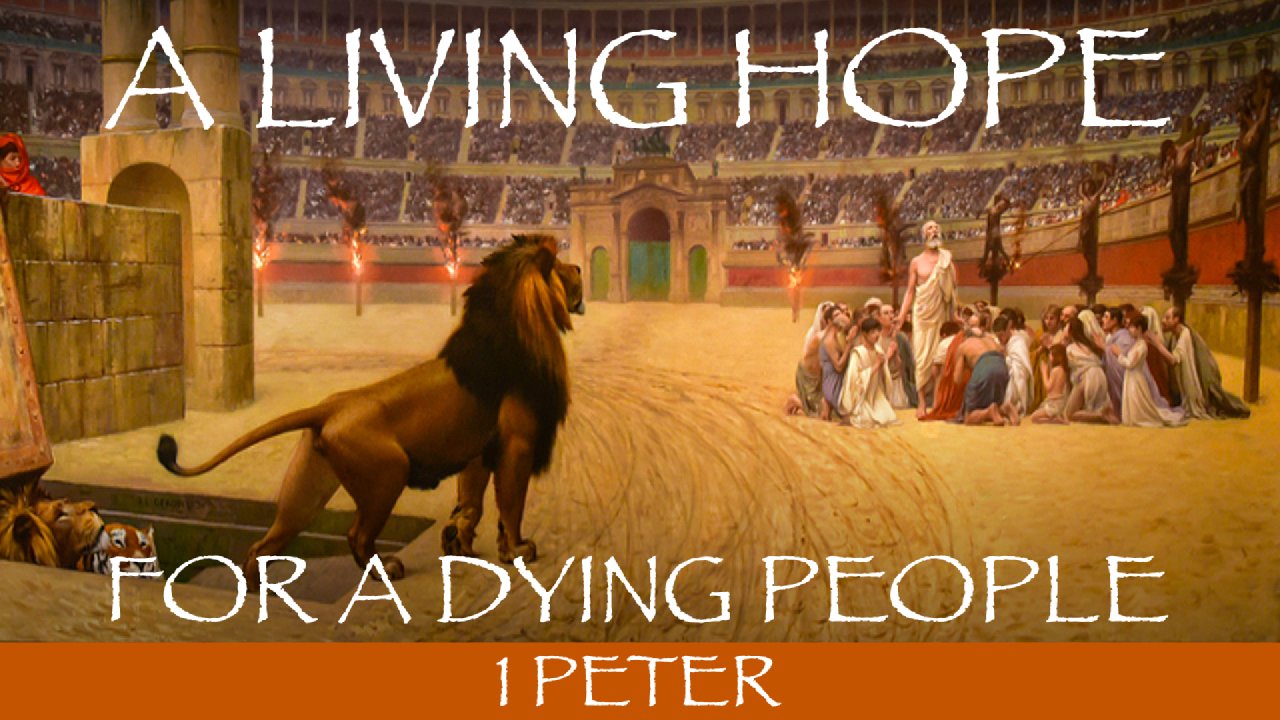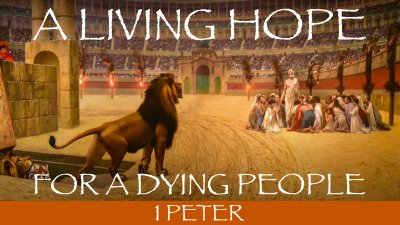Chicken little said the sky is falling and it seems many Christians say the same when they think about current events and the end of the world. But is that how the Bible speaks about the end of the world?
This Sunday we will consider the end of the world and the grace of God which purifies us through the fiery trials that God has prepared for us. As you prepare for Sunday, take time to read 1 Peter 4:12-19. But also read over 1 Peter and consider the ways Peter talks about the end. This will help you to see what we all will see in 1 Peter 4:12-19 this Sunday.
As I write this from Indianapolis where I am teaching eschatology, I can’t wait to get home and worship our risen Lord with you. May the exalted Christ be praised in our assembling.
For His glory and your joy,
Pastor David
-----------------------------------------------------------------------------------------------------
Discussion & Response Questions for 1 Peter 4:12-19
1. Does persecution and suffering seem like a stranger to you? Instead of being surprised by sufferings, what does it look like for us to be surprised by joy?
2. Does rejoicing, gladness, and blessing come to mind when facing suffering?
3. How does Peter reassure and encourage the church?
4. Consider Peter’s command to glorify God (v. 16). Might one be tempted to be ashamed? See Acts 5:40-42.
5. What does it mean that judgment begins at the house of God? Why does Peter insert this warning? (vv. 17-19) How should we respond to this?
6. What does it mean to “obey the gospel of God”?
7. How does Peter teach them to suffer (v. 19)? What is the sufferer to do? Consider Psalm 31:5; Luke 23:46.

17. Preparing Our Head, Heart, and Hands for the End of the World (1 Peter 4:12-19)
Sermon
June 13, 2021 • David Schrock • 1 Peter 4:12–19
19. Mission Accomplished: Grace from Beginning to End (1 Peter 5:5-15)
June 27, 2021 • David Schrock • 1 Peter 5:5–14
In John 1:14–18, the beloved apostle describes the grace of the law and the greater grace of the gospel as “grace upon grace". And in his opening words to his Gospel, he explains that grace and truth are now found in the person and work of Jesus Christ, the Lord Incarnate. At the end of Peter’s letter, the same emphasis on grace is seen. Only the largesse of God’s grace is not found in redemptive history, but in the church’s personal experience of grace. Throughout Peter’s letter, the restored apostle has testified to the true grace of God that is found ready to aid all those who are born again by the Spirit. Even more, Peter has explained the sufferings of Christ’s followers in terms of the sanctifying grace that accompanies such fiery trials. Knowing this grace strengthens believers to follow Christ fully. And this Sunday, as we come to the end of 1 Peter, we will conclude our sermon series by considering all that Peter says about grace in 1 Peter 5:5–14. As you have time, please read 1 Peter 5 to prepare for Sunday. You may also find help in reading James 4 or Proverbs 3 in preparation for worship. Pray that God would continue to lavish his grace upon us, as we cast our cares on him and find fresh mercies to follow him fully. I look forward to seeing you Sunday and to worshiping the true God of grace with you. For His Glory and your joy, Pastor David -------------------------------------------------------------------------------------------------------------------------------------------------------------- Discussion & Response Questions for 1 Peter 5:5-14 1. Why should humility be a distinctive mark of the church? 2. How is humility to appear in our relationship to elders, to one another, and to God? (vv. 5-7) 3. The Greek word for “opposes” (v. 5) and “resist” (v. 9) is identical. What does this teach us about humility, pride, and spiritual warfare? 4. How are prayerfulness (v. 7) and faith (v. 9) connected to humility? 5. What is the role of humility when it comes to resisting the devil? 6. What truths should the church remember when they suffer persection? 7. What promises and words of encouragement and assurance does Peter give to the church? (vv. 5, 6, 7, 10) 8. Look for the repetition of grace in this text (vv. 5, 10, 12). How does this instruct us? 9. Practically, what does it look like to stand firm in the gospel? How might we grow in standing firm? 10. How might this text shape our resolve as Christians?
18. Good Shepherds: 7 Marks of a Faithful Under-Shepherd (1 Peter 5:1-4)
June 20, 2021 • David Schrock • 1 Peter 5:1–4
Forbes Magazine lists 100 Quotes on Leadership. When bookstores used to be brick and mortar, you could always find a leadership section. And aspiring leaders may spend (tens of) thousands of dollars each year on coaching, conferences, and other ways to become better leaders. In the Bible, we also find a lot about leadership. But what we don’t find are leadership techniques. Instead, we find offices like prophet, priest, king, and shepherd. We discover that the greatest leader laid his life down for those whom he loved. And in Christ and those who followed him, we are given a vision of what a leader is. We also find many examples of bad leaders too. Simultaneously, in both testaments, we find lists of qualifications for leaders (see Exodus 18, Deuteronomy 17–18; 1 Timothy 3; and Titus 1). These lists are always based on character, and if anyone wants to be a leader in the church, they must look to God’s standards. This Sunday, we will do just that. Writing to a suffering church, Peter addresses the lead sufferers, the shepherds who are leading the sheep. In less than five verses, we will discover in 1 Peter 5:1–5, a host of characteristics that you should recognize in those who lead the church. And current and aspiring leaders should be able to test themselves by these verses too. To prepare for Sunday, please read 1 Peter 5. You will also be helped if you read Ezekiel 34 and John 10. These two background passages will give you the biblical context for Peter’s words, as they show what a good shepherd is and is not. After spending a week with a flock of shepherds at the SBC this week, I am glad to be with you and to be one of your shepherds. It is one of the greatest joys in my life. And as we come to the text of 1 Peter 5, let us pray that the Chief Shepherd, Jesus Christ, will continue to shepherd us as we hear his voice and follow his lead. See you Sunday (DV). For His Glory and your joy, Pastor David ---------------------------------------------------------------------------------------------------------------------------------------------- Discussion & Response Questions for 1 Peter 5:1-5 1. What is significant about how Peter describes his identity? How does this set the tone for this exhortation? 2. How does Peter describe the work of an elder? 3. What qualifications does Peter give for the motives of elders in their ministry? 4. What is the difference between an elder, a shepherd, and an overseer? What nuances do these words give in describing the same office? 5. “that is among you.” What does this say about the work of shepherding? 6. How does willingness, eagerness, and living as an example bless the flock? 7. What are some of the differences between a good shepherd and a not-so-good shepherd? (See also Ezekiel 34 and John 10) 8. How do wrong motives distort the work of pastoral ministry and damage the church? 9. How does Peter describe Christ? 10. What is the elders’ responsibility to Christ? 11. What does this text reveal about hierarchical relationships in the church? 12. What exhortation does Peter give to the congregation? What exhortation and caution does Peter give to both the elders and the congregation? 13. How should we respond to God’s design for the church? 14. How should we respond to these promises of grace and glory?
16. Insight into Suffering for the Glory of Christ (1 Peter 4:1-11)
June 6, 2021 • Rod Fillinger • 1 Peter 4:1–11
This Sunday we continue our study in 1 Peter where Peter points us to a living heavenly hope. Earlier in his life we have recorded an account of a young man who was anxious for Christ to establish a physical kingdom of God that would overthrow human government, end suffering, and rule victorious. In his impetuous zeal that lacked knowledge he even rebuked Christ himself when Christ spoke clearly about the need for his suffering and death. In these last days, and the nearing end of Peter’s life on earth, Peter writes with a different perspective. He writes about our heavenly hope in the kingdom of God, a kingdom that will come after the suffering of saints for their faith. In response to the suffering that must come, Peter sets forth rules for life – a Christian ethic for living in light of suffering. In returning to the theme of Christ’s suffering that we saw in chapter 3, Peter presents suffering not as an exception, but as the rule for true believers. Peter directs the elect exiles, which includes us, to see the suffering and death of Jesus Christ as the pattern for Christian living and service. The suffering Peter describes is for a purpose – being done with sin. This man who rebuked Christ, then denied him, now exhorts us to arm ourselves not with a sword, but with the same mind-set that Christ had in doing the Father’s will. Peter was changed because he came to know and trust Jesus Christ. May Peter’s words written through the inspiration of the Holy Spirit be used to open our eyes that we would know Jesus in this same way so that in everything God may be glorified through Christ Jesus. As you prepare for Sunday, take time to read over 1 Peter 3-4 again and pray for God to continue to conform our church body into the image of Christ by changing the way we think. I look forward to seeing you on Sunday. And remember, we will plan to gather outside at 8:30am for service and 10:30am for Great Commission Prayer. For God’s glory and your joy, Pastor Rod -------------------------------------------------------------------------------------------------------------------------------------------------------------- Discussion & Response Questions 1 Peter 4:1-11 1. What does it mean for us to “arm yourselves with the same way of thinking” (v.1)? 2. How does Christ’s suffering reorient us (vv. 1-2)? 3. What does Peter teach about the purpose of life? How does this contrast with unbelievers? 4. While God’s judgment is in view for the Gentiles (vv. 3-5), what is in view for the Christian? (vv. 6-7)? 5. Does “the end of all things” being at hand motivate you? What should it motivate us toward? 6. Do you think of prayer as a primary response to loving and serving the Lord? How would arming yourself with the same way of thinking as Christ change your approach to and practice of prayer? (v. 7) 7. What does it mean practically for each of us individually and collectively to be self-controlled and sober-minded? (v. 7) 8. How does Peter explain what it means to “love one another earnestly”? (vv. 8-11) 9. Have you been gifted? For what purpose are you gifted? (Notice the source of the oracles and strength). 10. Is the glory of God our aim? How does one become passionate or zealous for the glory of God?





